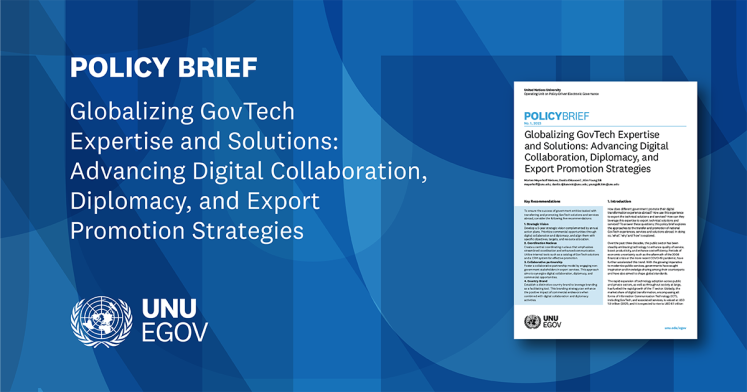A new policy brief released by the United Nations University Operating Unit on Policy-Driven Electronic Governance (UNU-EGOV) explores how governments can promote their digital transformation experience abroad and leverage it to export their technical solutions and services. The policy brief, titled “Globalizing GovTech Expertise and Solutions: Advancing Digital Collaboration, Diplomacy, and Export Promotion Strategies”, examines the ‘what’, ‘why’ and ‘how’ of transferring and promoting national GovTech experiences, services, and solutions abroad.
GovTech, or the use of technology to improve public service delivery, has been steadily embraced by the public sector over the past three decades, especially during economic uncertainty such as the aftermath of the 2008 financial crisis or the more recent COVID-19 pandemic. With the growing imperative to modernize public services, governments have sought inspiration and knowledge-sharing among their counterparts and aimed to shape global standards.
The policy brief argues that governments can benefit from globalizing their GovTech expertise and solutions in three ways: by enhancing their digital collaboration, diplomacy, and export promotion strategies. Digital collaboration refers to the sharing of best practices, lessons learned, and technical assistance among governments to foster mutual learning and innovation. Digital diplomacy refers to using digital tools and platforms to advance national interests, values, and influence in the international arena. Export promotion refers to the marketing and selling national GovTech solutions and services to foreign governments and other clients.
The policy brief also provides five recommendations for government entities transferring and promoting GovTech solutions and services abroad. These are:
- Develop a 5-year strategic vision complemented by annual action plans. Prioritize commercial opportunities through digital collaboration and diplomacy and align them with specific objectives, targets, and resource allocation.
- Create a central coordinating nucleus that emphasizes streamlined coordination and enhanced communication. Utilize internal tools such as a catalogue of GovTech solutions and a CRM system for effective promotion.
- Foster a collaborative partnership model by engaging non-government stakeholders in export services. This approach aims to synergize digital collaboration, diplomacy, and commercial opportunities.
- Establish a distinctive country brand to leverage branding as a facilitating tool. This branding strategy can enhance the positive impact of commercial endeavours when combined with digital collaboration and diplomacy activities.
- Monitor and evaluate the outcomes and impacts of the globalizing GovTech initiatives. Use data and feedback to inform decision-making and improve performance.
The policy brief is available for download from our Collections website here.




